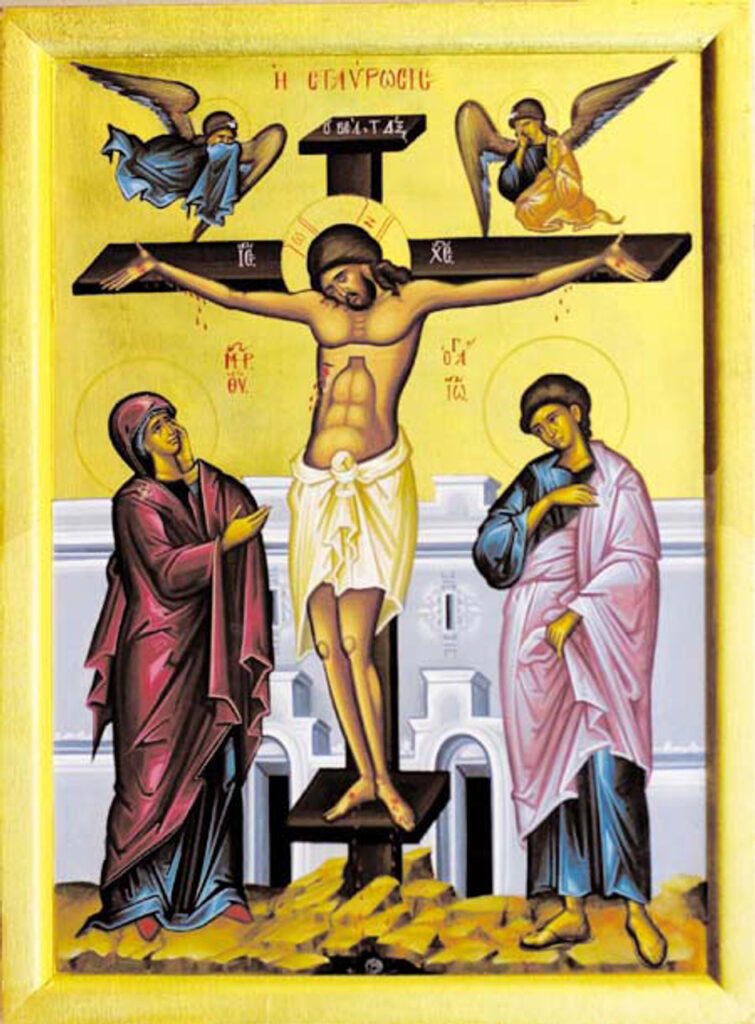In the name of the Father, and of the Son, and of the Holy Spirit, one God, Amen.
The Roman Empire knew how to maintain law and order, to maintain stability, to maintain the pre-eminence of the Roman citizens, and this Pax Romana was maintained through brutality and cruelty: as recorded by Tacitus,
If the enemy be rich, they are rapacious; if he be poor, they lust for dominion; neither the east nor the west has been able to satisfy them. Alone among men they covet with equal eagerness poverty and riches. To robbery, slaughter, plunder, they give the lying name of empire; they make a desert and call it peace.
Agricola, 30
And for the most wicked of its enemies, those for whom mutilation, slavery or slaughter were too kind, they invented a tortuous death from where we get the word excruciating, they invented crucifixion. Only rarely would they die from blood loss: striped naked and left exposed to the unyielding sun, with the arms held unnaturally high, the crucified would find it increasingly hard to breathe, so they would endure the pain of pushing themselves up with their legs to snatch a breath before slumping down again: hours would pass until the soldiers decided to break the legs so the condemned would finally suffocate. Then often they would be left on the cross as carrion for vultures and a reminder to would-be freedom fighters not to challenge the Roman Peace. Yet, despite this cruelty shown to the condemned, the prophecy of the High Priest rang true, “it is expedient for us that one man should die for the people, and not that the whole nation should perish.” (John 11:50) For Caiaphas knew the Roman Army would be content to turn Jerusalem into a wasteland in order that Roman Peace be maintained in Judea and in the Empire.

“And as Moses lifted up the serpent in the wilderness,” Christ tells us today, “so must the Son of man be lifted up, that whoever believes in him may have eternal life.” Christ comes not being scandalised by suffering but by entering into it voluntarily. “Now the Son of Man is glorified,” says the Lord, “and God is glorified in him.” (John 13:31) For God speaks to us of his glory through the Word of the Cross—not the words from the Cross, as precious and as full of meaning as they are to us, but the Word of the Cross himself. And the ultimate Word of God to our race is given to us: the most beautiful and eloquent Word ever spoken hangs on the Cross in silence, and all we can do is look upon the King of Glory who hangs there for my sins, “For God so loved the world that he gave his only Son, that whoever believes in him should not perish but have eternal life.”
Let us today, my dear brothers and sisters in Christ, gaze upon our crucified God and contemplate the great mystery which he has wrought in uniting us with him by granting us eternal life.
To our crucified and risen Saviour Jesus Christ be all glory, honour and worship, together with his unoriginate Father and the All-holy, Good and Life-giving Spirit. Amen.
Brethren, see with what large letters I am writing to you with my own hand. It is those who want to make a good showing in the flesh that would compel you to be circumcised, and only in order that they may not be persecuted for the cross of Christ. For even those who receive circumcision do not themselves keep the law, but they desire to have you circumcised that they may glory in your flesh. But far be it from me to glory except in the cross of our Lord Jesus Christ, by which the world has been crucified to me, and I to the world. For neither circumcision counts for anything, nor uncircumcision, but a new creation. Peace and mercy be upon all who walk by this rule, upon the Israel of God. Henceforth let no man trouble me; for I bear on my body the marks of Jesus. The grace of our Lord Jesus Christ be with your spirit, brethren. Amen.
— Galatians 6:11–18
The Lord said, “No one has ascended into heaven but he who descended from heaven, the Son of man who is in heaven. And as Moses lifted up the serpent in the wilderness, so must the Son of man be lifted up, that whoever believes in him may have eternal life. For God so loved the world that he gave his only Son, that whoever believes in him should not perish but have eternal life. For God sent the Son into the world, not to condemn the world, but that the world might be saved through him.
— John 3:13–17
